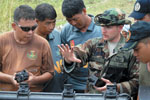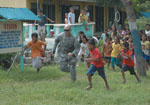 |
U.S. Navy Explosive Ordnance Disposal (EOD) Petty Officer 1st Class Alan Sinner, USN, demonstrates for his counterparts in the Armed Forces of the Philippines (AFP) and the Philippine National Police how to wire a remote detonator during a joint disposal operation in June near General Santos City, Philippines. The Joint Special Operations Task Force—Philippines (JSOTF-P) EOD teams work alongside their Philippine military and police counterparts to exchange expertise on tactics and procedures and to dispose of old, unusable munitions in Mindanao, Philippines. |
A joint special operations task force assists the defeat of terrorists and outreach to the populace in the Pacific.
Even as the United States continues to lead a coalition of countries in the battle against terrorism in Southwest Asia, another effort quietly continues to root out evildoers in the southeast portion of the continent. But unlike their counterparts in the deserts and mountains, the troops fighting in the jungles have a secondary position to their country hosts. Also present is a strong focus on non-war activities such as medical care and capacity building that demonstrates to citizens the dedication of both their government and that of the United States to improve their lives. The result of all this work has been a decrease in terrorist activities as well as enhanced quality of life for people in the region.
The Joint Special Operations Task Force–Philippines (JSOTF-P) supports the Armed Forces of the Philippines (AFP) in its fight against terrorism in the southern part of the country, specifically in Mindanao. This region encompasses the island of Mindanao as well as the Sulu Archipelago. Between 500 and 600 special operations and support personnel make up the task force, which works closely with the U.S. country team in Manila to ensure a coordinated, interagency approach to combating terrorism and promoting development in the area of operations. At the request of the Philippine government, the task force supports the Philippine Security Forces, which include the AFP and Philippine National Police (PNP), to defeat terrorists and shrink their safe havens, as well as create the conditions necessary for peace, stability and prosperity.
The JSOTF-P originated as Joint Task Force 510, which deployed to the Southeast Asia country in January 2002 to assist the military there to combat terrorists. In July of that year, the task force transitioned to its current identity. The U.S. troops operate “by, with and through” the AFP, according to the task force leader. “We do not do anything in Mindanao without our partners in the AFP,” says Col. William Coultrup, USA, the JSOTF-P commander. “Here in the Philippines we are in a supporting role assisting the AFP.”
The U.S. efforts in the region are dubbed Operation Enduring Freedom–Philippines, and the United States is the only nation supporting the Asian country in the counterterrorism efforts under that operation. Other nations such as Australia supply additional counterterror assistance, and Japan and the European Union provide humanitarian assistance and development projects. The United States and the Republic of the Philippines have had a strong relationship for decades, including joint defense during World War II. “We’ve united again in the face of the current threats to peace and security in the region,” Col. Coultrup says. “Our current support to their counterterrorism efforts is simply a continuation of that long history together.”
The JSOTF-P’s support of the AFP is organized along three primary lines of operation: capacity building, civil military engagement and information sharing. In capacity building, the task force works with the AFP to increase capacity and improve capabilities through subject matter exchange and other training programs. These efforts focus on subjects such as information operations, forward air control, civil military operations planning, mission planning, explosive ordnance disposal, maritime operations, tactical combat casualty care, marksmanship, small unit tactics, convoy security, casualty evacuation and public affairs and media relations.
Under the civil military engagement line, the JSOTF-P partners with the AFP, the U.S. country team, local government agencies and nongovernmental organizations to deliver humanitarian assistance to conflict-affected communities. This includes programs such as medical and dental civic action to deliver care where the need is great; veterinary civic action to provide farmers livelihood assistance; engineering civic action to provide local communities with infrastructure improvements; and education civic action to assist teachers from elementary school all the way to college level in English language instruction in the classroom.
Under its information-sharing efforts, the United States shares intelligence data and other information to assist the AFP in planning future operations.
The two nations partner to adopt a whole-of-government approach to resolving problems in the Mindanao region. “For instance, we are assisting the PNP in Sulu province through our Police Field Officer Training Course, which focuses on arrest tactics, evidence collection, prisoner handling, human rights and other subjects,” Col. Coultrup says. Another effort involves working closely with local governments across Mindanao to identify the needs of communities affected by conflict. Personnel then try to address the problems. “This could mean building a new school or water well, or sending medics to conduct a free clinic for local residents,” the colonel explains.
 |
Sgt. 1st Class Marcus Smith, USA, team medic for Civil Affairs Team 735, challenges the students of Ungkaykay Elementary School in Midsayap to a foot race in June. The JSOTF-P works with the AFP to fight terrorism and deliver humanitarian assistance in the southern region of Mindanao. Working with the AFP, the team helped facilitate the construction of a new two-classroom schoolhouse for Ungkaykay. |
Between 2008 and 2009, the AFP and the JSOTF-P completed more than 100 infrastructure projects such as new schools, roads, piers, water wells and medical centers. During that same period, the AFP-U.S. team provided free medical and dental care to more than 20,000 patients. That number jumps to 30,000 when Balikatan exercises—joint bilateral exercises between the two nations—are added. “Through these comprehensive civil military operations, the areas in which terrorists can operate are shrinking and the people are becoming more aware of their potential for peace and prosperity,” Col. Coultrup says. The efforts are similar to those in
Latin America, where governments are working to improve the lives of the people and thereby reducing support and acceptance of terrorist activities by local populations.
Col. Coultrup explains that humanitarian outreach and antiterrorism work go hand-in-hand in executing the mission of his task force. “Humanitarian operations show the people that the AFP and the Philippine government are making tangible efforts to improve their welfare, making them more likely to support the government’s efforts to eradicate terrorist groups,” he explains. To that end, the JSOTF-P and the AFP civil affairs teams and engineers constantly undertake infrastructure projects to enhance the security, education and welfare of Filipinos in the southern part of their country. “As we assist the AFP in constructing these projects, it is important to remember that these programs not only improve the lives of these people, but they also help to loosen the grip that terrorist elements have in these areas,” the colonel states.
Outreach also extends to legal support. The JSOTF-P legal team works with local prosecutors, advising them how to develop solid cases against suspected terrorists so they can be prosecuted effectively in the country’s courts. In the north-central region of Mindanao, the task force works with the AFP to partner with the Philippine Department of Agriculture. In this project, the various organizations strive to promote livelihood assistance programs for former rebel combatants. “These programs are designed to show them there is hope for a better life if they will lay down their arms, and also to encourage other rebels to stop fighting the government,” the colonel states.
The task force and its Filipino partners have had success convincing enemy combatants to reform their way of life. “We have seen the surrender of some rogue elements of the Moro Islamic Liberation Front in central Mindanao who have chosen to lay down their arms in search of better lives,” Col. Coultrup says. “The AFP is working with Philippine government agencies to help reintegrate these former fighters and their families into society and provide them livelihood assistance. As other fighters see how the government is aiding these former rebels, we hope that they too will lay down their arms.”
The two primary terrorist groups the United States is concerned about in the Philippines are Jemaah Islamiyah and the Abu Sayyaf Group. Jemaah Islamiyah conducted the 2002 nightclub bombing in Bali, Indonesia, that killed 200 people and wounded 300. The organization is thought to be responsible for numerous other bombings in the Philippines that have killed dozens and wounded hundreds during the past nine years. Jemaah Islamiyah most recently is suspected of bombing two hotels in Jakarta, Indonesia, on July 17 of this year.
The Abu Sayyaf Group also has wreaked havoc in the Philippines, carrying out numerous terrorist attacks throughout the country over the past 10 years. The crimes include bombing a Super Ferry in 2004, killing 116 people in what Col. Coultrup calls “the Philippines’ worst ever terrorist attack.” The group actively undertakes kidnapping for ransom activities in the Basilan and Sulu provinces. In January 2009 the group kidnapped three International Red Cross workers in the Sulu province. The last of the three was released unharmed on July 12.
The AFP and JSOTF-P have made many inroads against Jemaah Islamiyah and the Abu Sayyaf Group just as they have had success with the Moro Islamic Liberation Front. “Every day, U.S. forces are helping Philippine security forces to make Mindanao more stable and secure and to create conditions for economic development, growth, prosperity and peace,” Col. Coultrup says. “We are gradually shrinking terrorist safe havens and hampering these groups’ ability to conduct operations in the southern Philippines.”
He also explains that, “Shoulder-to-shoulder, AFP and U.S. forces in the Southern Philippines have frustrated plans and capabilities of Jemaah Islamiyah and Abu Sayyaf Group. The real credit belongs to the Philippine government and its security forces. They are leading and winning the fight against terrorist organizations, and their influence in the region. We are simply assisting. Abu Sayyaf Group and Jemaah Islamiyah have been significantly reduced from the apex of their power.”
The relentless pursuit of the Abu Sayyaf Group by the AFP has resulted in a splintering of the group in recent years, which has reduced the terrorists’ primary focus to kidnapping and other criminal activities. The group has been unable to conduct a major attack since 2005 when it detonated a series of bombs in Manila and Mindanao that killed 11 people and injured 93 more. In addition, the estimated strength of Abu Sayyaf Group has dropped from more than 1,200 in 2002 to fewer than 500 today, according to the colonel. “Much of that reduction came after the AFP launched a major offensive against [the group] in August 2006,” he says.
Efforts against Jemaah Islamiyah also have yielded positive results. The organization is estimated to have fewer than 100 members remaining in the country. However, the colonel explains that the handful of insurgents is still dangerous because they recruit, finance and train the next generation of terrorist bombers and fighters. Yet the AFP also becomes more capable each day because of training and expertise provided by U.S. forces.
The work and partnership benefit both nations. The Philippines receives assistance in its fight against terror groups operating in the south, ultimately making the country more stable and secure. The United States benefits as terrorist groups are neutralized because that reduces threats to U.S. citizens and interests. “As the Philippines become more secure and terrorist safe havens are eliminated, America becomes more secure,” Col. Coultrup explains.
The location and goals of the JSOTF-P naturally lead to some challenges. One is that counterinsurgency efforts take time. “While the number of key leaders in the Jemaah Islamiyah and Abu Sayyaf Group may be relatively small, helping the AFP to neutralize them is difficult,” Col. Coultrup explains. “The dense and difficult jungle and mountain environment makes pinpointing them and apprehending them a challenge. Some of the areas that they operate in have limited government presence. Helping the Philippine government establish a presence there helps to shrink the enemy safe havens.”
He adds that despite the successes the nations have had, much work remains to eliminate significant terrorist leaders at large and to develop local law enforcement, judicial and governing institutions as well as private enterprise, education and commerce. The JSOTF-P’s operating environment differs from that in Afghanistan and Iraq. Missions are conducted within the Kapit Bisig framework and the Visiting Forces Agreement, which dictate a purely supporting role for U.S. military forces. The task force personnel work in conjunction with Philippine Security Forces counterparts and do not engage in combat operations. “While this can be an adjustment for some of our people, it is critical for the success of this mission that we respect the Philippine constitution and the sovereignty of the Philippine people,” the colonel says.
Two factors that have caused only minor challenges for the task force are language and culture. English is taught in the Philippines’ school system as the language of international communication, so most Filipinos speak the language fluently. When task force members encounter citizens who do not speak English, their AFP counterparts translate. And though Col. Coultrup acknowledges that culture differences certainly exist, his troops adapt just as they would in any foreign country. “The Filipino people are gracious and generous, and working with our counterparts in the AFP has been one of the most rewarding aspects of the mission,” he shares.
In terms of technology, the colonel says he often is surprised at the ingenuity of the AFP to overcome challenges without the latest technology that U.S. forces might have used to solve the same problems. He explains that task force members learn from the Filipinos’ ability to tackle obstacles with limited resources, and they make their technology available to the AFP to assist them in their operations whenever possible.
WEB RESOURCES
Special Operations Command Pacific: www.socpac.socom.mil
Armed Forces of the Philippines: www.afp.mil.ph
Philippine National Police: www.pnp.gov.ph





Comments